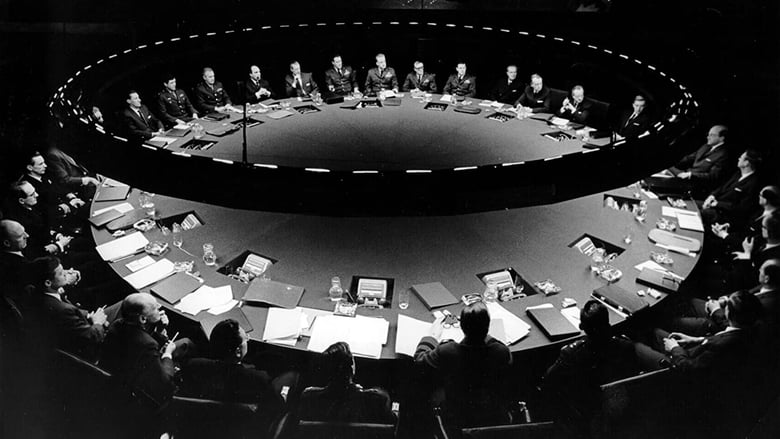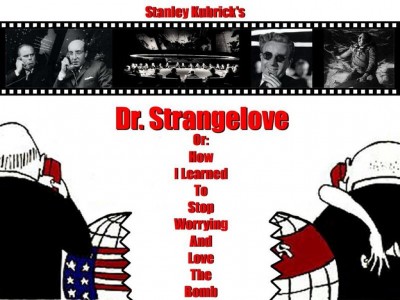← Back to Reviews

in
Never has the absurdity of war been so bitingly and accurately skewered as it was in the 1964 classic Dr. Strangelove: Or How Learned to Stop Worrying and Love the Bomb. a scorching black comedy that sheds a very unflattering but unfortunately probably spot-on look not only at war, but the mental capacities of the people who have their hands on the button.

Director Stanley Kubrick has created his masterpiece here, chronicling what happens when a clearly insane military general who triggers an attack on the Soviet Union that could lead to nuclear holocaust and how the President of the US and his advisers try to deal with the repercussions.

Released during the infancy of the Vietnam War, this film probably ruffled a lot of feathers in Washington, though I don't know for sure, since I was only six year old at the time, but the film can now be cherished for the scathingly brilliant satire that it is.

Kubrick's masterful direction is only surpassed by the brilliantly tongue-in-cheek screenplay by Kubrick, Terry Southern, and Peter George, that was clearly robbed of an Oscar. As for casting, it's perfection...Peter Sellers' powerhouse performance where he effortlessly brings three different characters to life is a joy to behold. Sellers, too, was robbed of an Oscar for Outstanding Lead Actor. My personal favorite of his three characters was President Muffley, who is given the best line in the movie and whose first phone conversation with the President of the USSR (Dimitri) to explain what's going on had me on the floor. Sellers has never made me laugh so hard, and I've seen most of the Pink Panther movies. Kubrick pulled the performance of his career out of Sterling Hayden as the insane general as was George C. Scott's bigoted military leader who is possibly as crazy as Hayden's character. Scott is brash and funny and was Oscar-worthy as well.

Kubrick's attention to detail in bringing this epic story to life works on every level. The black and white photography only adds to the realism and there is impressive art direction and inventive camerawork, but it is the Oscar worthy work by Kubrick, Sellers, Scott, Southern, and George that make this one sizzle and earn it the well-deserved reputation of a classic.

Director Stanley Kubrick has created his masterpiece here, chronicling what happens when a clearly insane military general who triggers an attack on the Soviet Union that could lead to nuclear holocaust and how the President of the US and his advisers try to deal with the repercussions.

Released during the infancy of the Vietnam War, this film probably ruffled a lot of feathers in Washington, though I don't know for sure, since I was only six year old at the time, but the film can now be cherished for the scathingly brilliant satire that it is.
Kubrick's masterful direction is only surpassed by the brilliantly tongue-in-cheek screenplay by Kubrick, Terry Southern, and Peter George, that was clearly robbed of an Oscar. As for casting, it's perfection...Peter Sellers' powerhouse performance where he effortlessly brings three different characters to life is a joy to behold. Sellers, too, was robbed of an Oscar for Outstanding Lead Actor. My personal favorite of his three characters was President Muffley, who is given the best line in the movie and whose first phone conversation with the President of the USSR (Dimitri) to explain what's going on had me on the floor. Sellers has never made me laugh so hard, and I've seen most of the Pink Panther movies. Kubrick pulled the performance of his career out of Sterling Hayden as the insane general as was George C. Scott's bigoted military leader who is possibly as crazy as Hayden's character. Scott is brash and funny and was Oscar-worthy as well.

Kubrick's attention to detail in bringing this epic story to life works on every level. The black and white photography only adds to the realism and there is impressive art direction and inventive camerawork, but it is the Oscar worthy work by Kubrick, Sellers, Scott, Southern, and George that make this one sizzle and earn it the well-deserved reputation of a classic.
